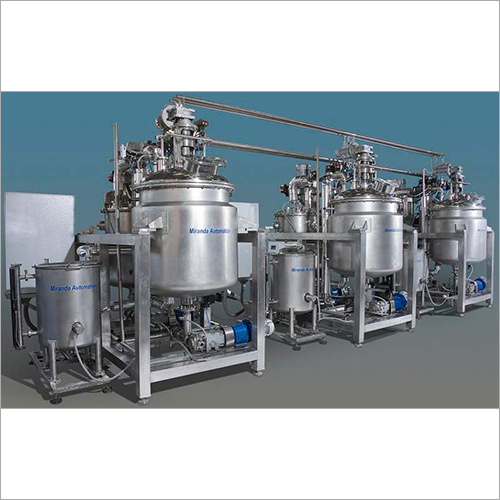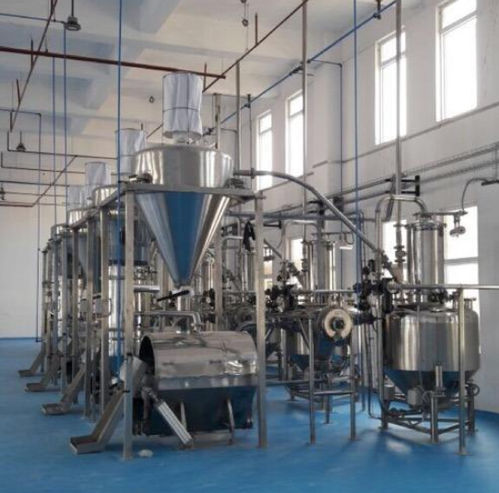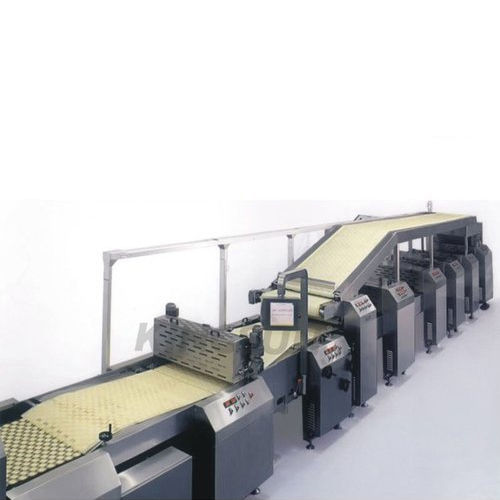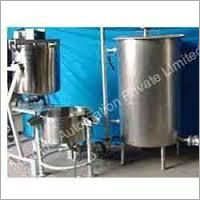Call Us:- 08045801637

Confectionery Plant
Product Details:
- Product Type Confectionery Plant
- General Use Industrial
- Material Stainless Steel
- Automatic Yes
- Power Source Electric
- Color Sliver
- Click to view more
X
Confectionery Plant Price And Quantity
- 1 Piece
Confectionery Plant Product Specifications
- Yes
- Electric
- Industrial
- Stainless Steel
- Confectionery Plant
- Sliver
Confectionery Plant Trade Information
- 10 Piece Per Month
- 2 Months
Product Description
We are a big name that deals in the manufacturing and supplying of high-performance Confectionery Plant that is designed and developed by our team of skilled professionals using advanced technologies and heavy engineering materials that leads to high working efficiency and capability to bear harsh industrial conditions. The processing chambers of this industrial plant are provided with a non-corrosive coating that acts as a protective barrier to prevent damages due to corrosive elements. Customers can get Confectionery Plant from us at a reasonable price range.
Applications of Confectionery Plant:
A confectionery plant is a facility designed for the production of confectionery products, which include a wide range of sugary treats such as candies, chocolates, chewing gum, toffees, and more. These plants are equipped with specialized machinery and equipment to efficiently produce large quantities of confectionery items. Some of the applications and benefits of a confectionery plant include:
1. Large-scale production: Confectionery plants are capable of producing confectionery items on a mass scale, allowing manufacturers to meet high market demands and distribute their products more widely.
2. Consistent product quality: Advanced machinery and automated processes in a confectionery plant ensure a high level of consistency in product quality, taste, and appearance.
3. Diverse product range: Confectionery plants can produce a wide variety of products, from simple hard candies to complex filled chocolates, offering consumers a diverse range of options.
4. Customization: Some confectionery plants have the capability to offer customized confectionery products tailored to specific tastes, occasions, or promotional purposes.
5. Efficiency and cost-effectiveness: Automation and optimized production processes in confectionery plants can lead to increased efficiency, reducing production costs and potentially making confectionery products more affordable for consumers.
6. Quality control: Confectionery plants often have rigorous quality control measures in place to ensure that the products meet industry standards and food safety regulations.
7. Innovation in product development: Confectionery plants may have research and development facilities to create new and innovative products, exploring different flavors, textures, and packaging options to keep up with changing consumer preferences.
8. Employment opportunities: Running a confectionery plant requires skilled workers and technicians, contributing to job creation in the manufacturing sector.
9. Export potential: Confectionery plants capable of producing high-quality products in large quantities can explore opportunities for export, expanding the market reach of their offerings.
10. Brand growth and recognition: With the ability to meet demand and consistently deliver quality products, confectionery plants can help grow a brand's reputation and recognition in the market.
11. Seasonal and promotional items: Confectionery plants can cater to seasonal demands, producing special holiday-themed products or collaborating with brands for promotional tie-ins.
12. Bulk and retail packaging: Confectionery plants can package products in bulk for distribution to retailers or package them directly for sale to consumers.
13. Private label manufacturing: Confectionery plants can partner with retailers or other businesses to produce private label confectionery products, further expanding their business opportunities.
FAQs of Confectionery Plant:
Q. What is a confectionery plant?
Ans: A confectionery plant is a specialized facility designed for the large-scale production of confectionery products such as candies, chocolates, chewing gum, toffees, and more.
Q. What types of confectionery products can be produced in a confectionery plant?
Ans: Confectionery plants can produce a wide variety of products, including hard candies, soft candies, chocolate bars, filled chocolates, toffees, caramels, chewing gum, lollipops, and more.
Q. What machinery and equipment are used in a confectionery plant?
Ans: Confectionery plants are equipped with various machines, such as mixers, extruders, moulders, depositors, enrobers, cooling tunnels, wrapping machines, and packaging equipment, to handle different stages of production.
Q. How are confectionery products made in a plant?
Ans: The production process varies depending on the type of confectionery being made, but generally involves mixing ingredients, cooking or conching, moulding or shaping, cooling, and packaging.
Q. What are the food safety regulations and standards that confectionery plants must adhere to?
Ans: Confectionery plants must comply with local and international food safety regulations and standards, such as Good Manufacturing Practices (GMP), Hazard Analysis and Critical Control Points (HACCP), and specific regulations for food additives and labeling.
Q. Can confectionery plants produce customized products for private labeling?
Ans: Yes, many confectionery plants have the capability to produce customized products for private labeling or co-packing, allowing other companies to brand the products as their own.
Q. How do confectionery plants ensure product quality and consistency?
Ans: Confectionery plants implement strict quality control measures throughout the production process to ensure product quality and consistency. This includes regular testing, inspections, and adherence to standard operating procedures.
Q. What are some challenges faced by confectionery plants?
Ans: Common challenges include managing ingredient sourcing, maintaining product consistency, optimizing production efficiency, complying with food safety regulations, and staying competitive in the market.
Q. How are allergens handled in confectionery plants?
Ans: Confectionery plants typically have procedures in place to prevent cross-contamination and properly handle allergens to ensure the safety of allergic consumers.
Q. Are confectionery plants environmentally friendly?
Ans: Some confectionery plants implement sustainable practices, such as using eco-friendly packaging materials, reducing energy consumption, and recycling waste, to minimize their environmental impact.
Q. Can confectionery plants cater to specific dietary preferences, such as vegan or gluten-free products?
Ans: Yes, many confectionery plants can produce products that cater to specific dietary preferences, including vegan, gluten-free, and sugar-free options.
Q. How can one start a confectionery plant?
Ans: Starting a confectionery plant involves careful planning, acquiring the necessary machinery and equipment, complying with regulations, and securing funding. It is essential to conduct market research to identify potential opportunities and competition.
Tell us about your requirement

Price:
Quantity
Select Unit
- 50
- 100
- 200
- 250
- 500
- 1000+
Additional detail
Mobile number
Email
Other Products in 'Automated Confectionery Plant' category
Back to top

 English
English Spanish
Spanish French
French German
German Italian
Italian Chinese (Simplified)
Chinese (Simplified) Japanese
Japanese Korean
Korean Arabic
Arabic Portuguese
Portuguese






